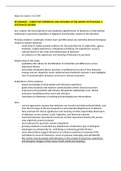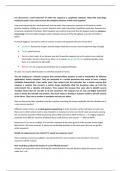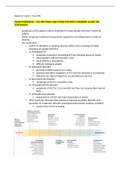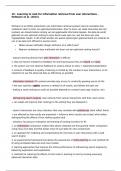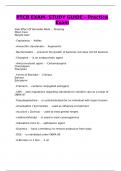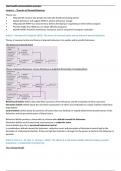Notes for week 2 4.3C SMI
RITUNNANO – SUBJECTIVE EXPERIENCE AND MEANING OF DELUSIONS IN PSYCHOSIS: A
SYSTEMATIC REVIEW
Aim: explore the lived experience and subjective apprehension of delusions in help-seeking
individuals in psychosis (regardless of diagnosis and thematic context of the delusion)
Previous evidence: systematic reviews have said little about any potential phenomenological
models to explain delusions
- small body of studies provide evidence for the potential role of subjectivity, agency,
emotions, insight experiences, metaphorical thinking, life experiences, social &
cultural factors in the onset and maintenance of delusions
- no evidence on the experience and meaning of delusions in psychosis
Added value of this study:
- qualitative data allows for identification of similarities and differences across
delusional themes
- new model mentioned above: provides a multilayered account of how delusions
emerge and are shaped by social, relational and emotional contexts; it also highlights
role of communicative dynamics and trust in clinical encounters
Implications of this evidence:
- deeper knowledge of what people with delusions experience
- guide clinical practice and improve communication within clinical encounters
- improved communication will enhance therapeutic relationship, trust, clinical
outcomes, benefiting service users and clinicians
- contribute to refinement of existing and developing new interventions
Intro
- current approaches assume that delusions are harmful and dysfunctional beliefs, and
miss the full range of the lived experience and potential adaptiveness of delusion
- they overlook the clinical significance and meaning of other experiential dimensions
of delusions across cultural, social, linguistics, and historical contexts
- mismatch between operational constructs and the experience lived by the person,
who might feel unseen/unheard
- psy treatment for psychosis remain suboptimal
- growing emphasis on potential psy adaptiveness of delusions (psy or biological
advantage e.g. temporarily inc. well-being or enhancing genetic fitness)
- some observations suggest delusions can enhance experience/meaning of life,
contribute to sense of coherence, sense of purpose, belonging and self-identity
- this review: how do people with delusions, in the context of psychosis, experience
and interpret changes in their sense of self, world and meaning?
, Results
- 3 analytical themes relating to experiential changes and meanings in relation to
participants’ delusions:
o radical rearrangement of the lived world dominated by intense emotions
1. alterations of basic reality, unusual sensory perceptions, bodily
perception; leading to change in experience of reality, causing
uncertainty and mistrust in oneself; reference or persecutory
delusions causing the environment become hostile and threatening;
reality changes were sometimes positive with the experience of
accessing heaven or entering the spiritual world
2. emotional and mental struggle; fear, shame, guilt; these feelings
leading to repetitive thinking which in turn lead to sense of losing
control; thinking described similar to compulsion for persecutory
delusions; some positive experiences linked to grandiose delusions
where repetitive thinking was a pleasant escape from boredom; some
positive experiences for persecutory such as enjoying attention
3. radical feelings of uncertainty and mistrust; leading to confusion
and disorientation causing hopelessness and despair; no longer able to
trust own judgement which shakes people’s world; mistrust and
abandonment in contrast to deep desire for connection and belonging
o doubting, losing, finding oneself again within delusional realities (complex and
dynamic process of interpersonal and intrapersonal identity negotiation and
self-constitution)
self-constitution: the way the self as a dynamical structure becomes
stable through adaptation and negotiation of its relationship with the
world
1. feelings of confusion and uncertainty, self-doubt and self-
fragmentation; losing self-identity; self-instability and inconsistencies;
hanging in the limbo; desire for normality; real-life interpersonal stress
further contributing to being vulnerable and under threat
2. place of others in the narrative; perceived self-discrepancies of their
ideal self or in the ideal state sig. others wished for them;
contributions to guilt, self-contempt and rejection; early experiences
of victimization and bullying; reinforced neg. self-evaluations; neg.
interactions in daily life confirming neg. self-evaluations
3. positive, self-enhancing effect of delusional experiences especially
in grandiose delusions; gaining clinical insight associated with
depressive feelings; you don’t feel like special and strong anymore
o searching for meaning, belonging, and coherence beyond mere dysfunction
(why is this happening to me, what significance does it have?)
1. threats to meaning and meaning-making processes in
communicative struggles; engaging in meaning-making efforts for
these unusual experiences; social epistemological aspects and
interactions; discounting other’s testimony or feedback; sometimes
leaving the person isolated in their own interpretive framework;
testimonial isolation (loss of communicative exchange) resulting from
secrecy of the delusional belief; strong desire for closure and
RITUNNANO – SUBJECTIVE EXPERIENCE AND MEANING OF DELUSIONS IN PSYCHOSIS: A
SYSTEMATIC REVIEW
Aim: explore the lived experience and subjective apprehension of delusions in help-seeking
individuals in psychosis (regardless of diagnosis and thematic context of the delusion)
Previous evidence: systematic reviews have said little about any potential phenomenological
models to explain delusions
- small body of studies provide evidence for the potential role of subjectivity, agency,
emotions, insight experiences, metaphorical thinking, life experiences, social &
cultural factors in the onset and maintenance of delusions
- no evidence on the experience and meaning of delusions in psychosis
Added value of this study:
- qualitative data allows for identification of similarities and differences across
delusional themes
- new model mentioned above: provides a multilayered account of how delusions
emerge and are shaped by social, relational and emotional contexts; it also highlights
role of communicative dynamics and trust in clinical encounters
Implications of this evidence:
- deeper knowledge of what people with delusions experience
- guide clinical practice and improve communication within clinical encounters
- improved communication will enhance therapeutic relationship, trust, clinical
outcomes, benefiting service users and clinicians
- contribute to refinement of existing and developing new interventions
Intro
- current approaches assume that delusions are harmful and dysfunctional beliefs, and
miss the full range of the lived experience and potential adaptiveness of delusion
- they overlook the clinical significance and meaning of other experiential dimensions
of delusions across cultural, social, linguistics, and historical contexts
- mismatch between operational constructs and the experience lived by the person,
who might feel unseen/unheard
- psy treatment for psychosis remain suboptimal
- growing emphasis on potential psy adaptiveness of delusions (psy or biological
advantage e.g. temporarily inc. well-being or enhancing genetic fitness)
- some observations suggest delusions can enhance experience/meaning of life,
contribute to sense of coherence, sense of purpose, belonging and self-identity
- this review: how do people with delusions, in the context of psychosis, experience
and interpret changes in their sense of self, world and meaning?
, Results
- 3 analytical themes relating to experiential changes and meanings in relation to
participants’ delusions:
o radical rearrangement of the lived world dominated by intense emotions
1. alterations of basic reality, unusual sensory perceptions, bodily
perception; leading to change in experience of reality, causing
uncertainty and mistrust in oneself; reference or persecutory
delusions causing the environment become hostile and threatening;
reality changes were sometimes positive with the experience of
accessing heaven or entering the spiritual world
2. emotional and mental struggle; fear, shame, guilt; these feelings
leading to repetitive thinking which in turn lead to sense of losing
control; thinking described similar to compulsion for persecutory
delusions; some positive experiences linked to grandiose delusions
where repetitive thinking was a pleasant escape from boredom; some
positive experiences for persecutory such as enjoying attention
3. radical feelings of uncertainty and mistrust; leading to confusion
and disorientation causing hopelessness and despair; no longer able to
trust own judgement which shakes people’s world; mistrust and
abandonment in contrast to deep desire for connection and belonging
o doubting, losing, finding oneself again within delusional realities (complex and
dynamic process of interpersonal and intrapersonal identity negotiation and
self-constitution)
self-constitution: the way the self as a dynamical structure becomes
stable through adaptation and negotiation of its relationship with the
world
1. feelings of confusion and uncertainty, self-doubt and self-
fragmentation; losing self-identity; self-instability and inconsistencies;
hanging in the limbo; desire for normality; real-life interpersonal stress
further contributing to being vulnerable and under threat
2. place of others in the narrative; perceived self-discrepancies of their
ideal self or in the ideal state sig. others wished for them;
contributions to guilt, self-contempt and rejection; early experiences
of victimization and bullying; reinforced neg. self-evaluations; neg.
interactions in daily life confirming neg. self-evaluations
3. positive, self-enhancing effect of delusional experiences especially
in grandiose delusions; gaining clinical insight associated with
depressive feelings; you don’t feel like special and strong anymore
o searching for meaning, belonging, and coherence beyond mere dysfunction
(why is this happening to me, what significance does it have?)
1. threats to meaning and meaning-making processes in
communicative struggles; engaging in meaning-making efforts for
these unusual experiences; social epistemological aspects and
interactions; discounting other’s testimony or feedback; sometimes
leaving the person isolated in their own interpretive framework;
testimonial isolation (loss of communicative exchange) resulting from
secrecy of the delusional belief; strong desire for closure and

